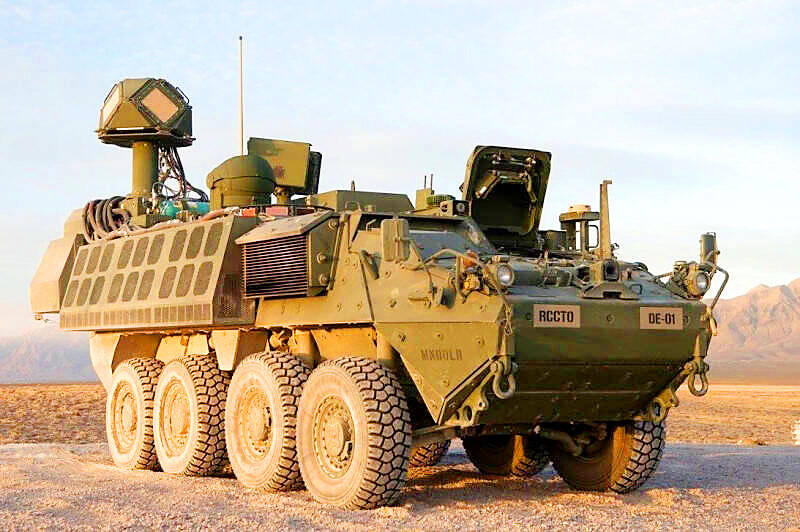Taiwan is poised to roll out a prototype 50-kilowatt (kW) vehicle-mounted laser weapon system by the end of the year, thanks to technical breakthroughs made possible through global assistance, a defense official said yesterday on condition of anonymity.
The project, which last year produced a low-powered prototype, is expected to create a full-powered system mounted on CM-32 Clouded Leopard wheeled armored vehicles for use against missiles and uncrewed aerial vehicles, the official said.
The state-run Chungshan Institute of Science and Technology has made great advancements in the project over a relatively short period with technological assistance from “international friends,” they said.

Photo: screen grab from Raytheon’s Web site
A 50kW laser possesses enough raw power output for combat applications, and the institute hopes that the system would be adopted by Taiwanese armed forces following the completion of trials and demonstrations, they said.
Members of the institute involved in the project have published articles in military journals exploring the operational potential of coupling directed-energy weapons with the army’s AN/TWQ-1 Avenger air defense vehicles, the official said.
The articles discuss the possible utilization of a laser system against the Chinese People’s Liberation Army’s Chengdu GJ-1 series of drones, as well as rocket and missile weapons, they said.
Directed-energy weapons are an emerging class of air-defense systems being developed to supplement conventional weapons, which are more expensive to fire and could be overwhelmed by a large number of drones or missiles.
Former Israeli prime minister Naftali Bennett has said that the estimated cost for intercepting Hamas missiles with a laser weapon is about US$3.50 per shot, whereas a Tamir interceptor, utilized in Israel’s Iron Dome system, costs US$40,000 to US$50,000.
Earlier this week, US defense media reported that four Directed Energy Maneuver-Short Range Air Defense prototypes had been dispatched to the Middle East to test “real-world applicability” operating in dusty conditions.
Directed-energy weapons are electromagnetic systems that convert chemical or electrical energy to radiate focused energy on a target to cause physical damage that degrades, neutralizes, defeats or destroys a hostile capability, according to the US Office of Naval Research.

A preclearance service to facilitate entry for people traveling to select airports in Japan would be available from Thursday next week to Feb. 25 at Taiwan Taoyuan International Airport, Taoyuan International Airport Corp (TIAC) said on Tuesday. The service was first made available to Taiwanese travelers throughout the winter vacation of 2024 and during the Lunar New Year holiday. In addition to flights to the Japanese cities of Hakodate, Asahikawa, Akita, Sendai, Niigata, Okayama, Takamatsu, Kumamoto and Kagoshima, the service would be available to travelers to Kobe and Oita. The service can be accessed by passengers of 15 flight routes operated by

Alain Robert, known as the "French Spider-Man," praised Alex Honnold as exceptionally well-prepared after the US climber completed a free solo ascent of Taipei 101 yesterday. Robert said Honnold's ascent of the 508m-tall skyscraper in just more than one-and-a-half hours without using safety ropes or equipment was a remarkable achievement. "This is my life," he said in an interview conducted in French, adding that he liked the feeling of being "on the edge of danger." The 63-year-old Frenchman climbed Taipei 101 using ropes in December 2004, taking about four hours to reach the top. On a one-to-10 scale of difficulty, Robert said Taipei 101

Taiwanese and US defense groups are collaborating to introduce deployable, semi-autonomous manufacturing systems for drones and components in a boost to the nation’s supply chain resilience. Taiwan’s G-Tech Optroelectronics Corp subsidiary GTOC and the US’ Aerkomm Inc on Friday announced an agreement with fellow US-based Firestorm Lab to adopt the latter’s xCell, a technology featuring 3D printers fitted in 6.1m container units. The systems enable aerial platforms and parts to be produced in high volumes from dispersed nodes capable of rapid redeployment, to minimize the risk of enemy strikes and to meet field requirements, they said. Firestorm chief technology officer Ian Muceus said

MORE FALL: An investigation into one of Xi’s key cronies, part of a broader ‘anti-corruption’ drive, indicates that he might have a deep distrust in the military, an expert said China’s latest military purge underscores systemic risks in its shift from collective leadership to sole rule under Chinese President Xi Jinping (習近平), and could disrupt its chain of command and military capabilities, a national security official said yesterday. If decisionmaking within the Chinese Communist Party has become “irrational” under one-man rule, the Taiwan Strait and the regional situation must be approached with extreme caution, given unforeseen risks, they added. The anonymous official made the remarks as China’s Central Military Commission Vice Chairman Zhang Youxia (張又俠) and Joint Staff Department Chief of Staff Liu Zhenli (劉振立) were reportedly being investigated for suspected “serious